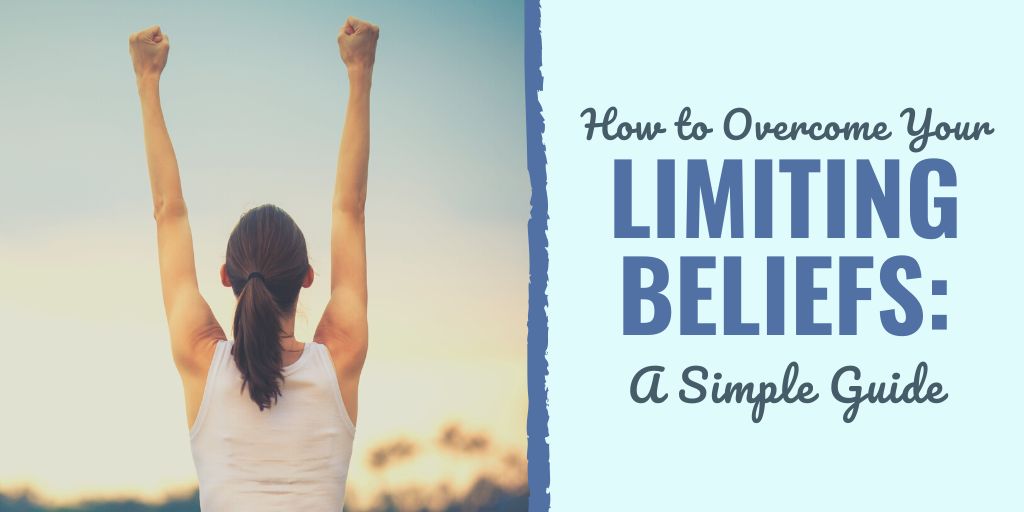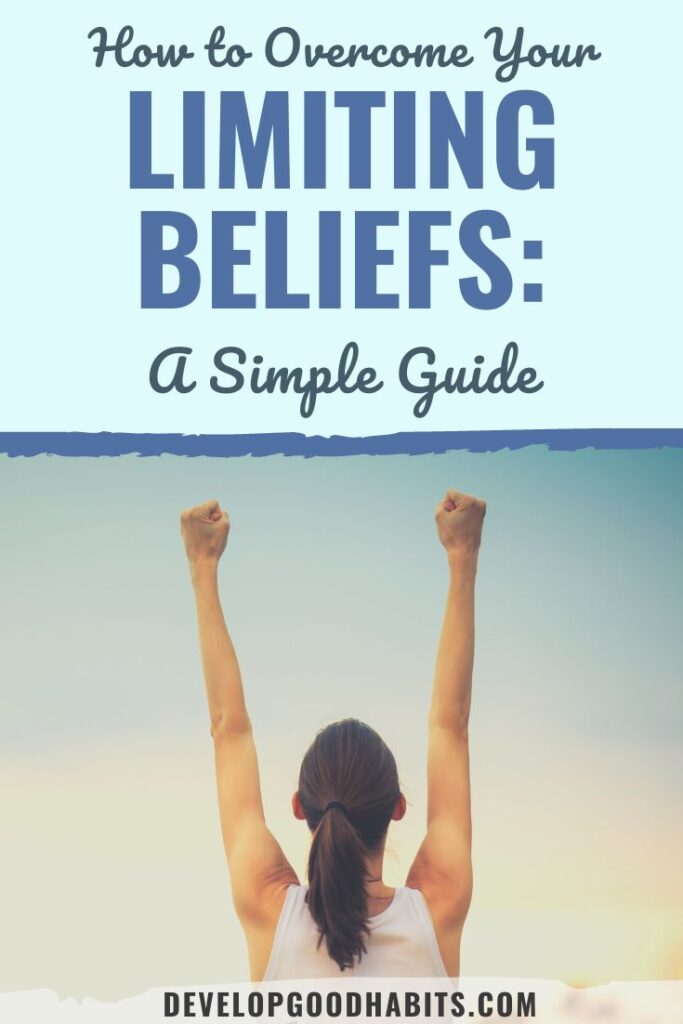There might be affiliate links on this page, which means we get a small commission of anything you buy. As an Amazon Associate we earn from qualifying purchases. Please do your own research before making any online purchase.
If you step back and look at your life, do you see patterns?
You may feel like you’re living your life on repeat if you stop to look at your relationships with other people, your financial habits, your work ethic, and any other area of your life that you’ve been trying to improve for what seems like forever.
But while we may promise that this time will be different, it rarely is.
But what is holding us back?
When I was in my early 20s, I think I promised myself every Sunday night that I would start eating healthy on Monday morning. But, without fail, I would find myself making the same empty promise the next Sunday night because I would slip back into my old habits each week.
Looking back, I didn’t think I could do it. I didn’t feel like I could commit to living a healthy lifestyle for any extended period of time, so I never actually tried to start. I held onto this limiting belief that it wasn’t possible to resist junk food and hours of television.
In this article, I will give you an overview of what limiting beliefs are and what you can do to deal with these mental blocks. Then I’ll show you how to identify your own limiting beliefs, and finally, how to overcome them.
Let’s start by looking at what limiting beliefs are.
What are Limiting Beliefs?
You probably already know that your subconscious mind is largely responsible for the decisions that you make. But did you know that your subconscious mind accounts for 95% of all of your thinking? That leaves a very small percentage of your decisions to be made consciously.
Furthermore, your beliefs are formed in this area of your mind that you don’t second guess. And, your beliefs are largely set before you even reach the age of 7. These beliefs that you learn as a child are ingrained in your brain to the point that you don’t stop to question them, even though they may be different for everyone.
Beliefs are conditioned impressions that stem from how you’ve interpreted prior experiences of pain and pleasure over time. By assigning a feeling or emotion to people, circumstances, and past incidents, we create the foundations of our beliefs.
Therefore, these beliefs act as psychological cues to your nervous system that mold your thoughts and interpret your experiences. They link your mind and body, and your thoughts with your behaviors.
For example, let’s say you grew up–like many people have–thinking snakes are bad. If you’re like me, if you were to come across a snake in your yard, or even while you’re on a hike, you would have a visceral reaction of fear that would send you running. You wouldn’t stop to think, you would just get out of there.
On the other hand, let’s say you work in the field of herpetology and you’ve spent a lot of time around snakes. Your reaction to seeing one would be very different. You would probably be able to maintain your composure.
My belief that snakes are bad is backed by a lifetime of hearing other people tell me that this is true. I haven’t personally had a close encounter with a snake, but I have heard other people’s horror stories enough that this “opinion” I hold is a strong belief, as I have no doubt in my mind that it’s true. Snakes don’t belong in my world.
I feel that having this belief keeps me safe, as I know that if I see a snake, it’s time to go. The fact that seeing a snake would cause me to panic in the moment is irrelevant because I need that certainty that I will be safe and I won’t come into contact with that snake.
I could read endless research articles and talk to a hundred snake handlers who might tell me the “truth” about snakes and their limited potential to overcome me. I don’t care. My truth is the only one I’m concerned with.
As humans, we crave this sense of certainty to reduce possible feelings of stress, anxiety, and doubt. It’s this feeling of being sure that builds the premise for our belief systems. But are the conclusions that we have come to…fact?
As a child, your beliefs probably benefited you in some way, which is why you continue to hang onto them. A child playing around with a snake might just not be the best idea. However, these beliefs potentially don’t serve the same purpose in adulthood, and could become a barrier to success if they’re not relevant to your life anymore.
Your life has changed, but if your beliefs stay the same, you’re going to be stuck in the past. Your perceptions are not facts, and without overcoming your limiting beliefs, you’re putting restraints on your growth.
Limiting beliefs are the thoughts that are ingrained in your brain that hold you back in some way. Because of these beliefs, you avoid doing certain things, which puts limits on your life. These beliefs are the stories you tell yourself that make you play it safe and hold back in the face of fear.
Let’s look at some examples of limiting beliefs that may be holding you back.
9 Examples of Limiting Beliefs
1. “I am not _____ enough.”
Athletic, wealthy, tall, qualified, attractive…however you fill in that blank is limiting you in some way. Maybe you don’t think you’re athletic enough to become a runner so you don’t even try to get in shape.
Or you’re not attractive enough to associate with a certain group of people, so you keep on walking whenever you see them in the break room.
Or your dream job becomes available, but you don’t bother to apply for it because you don’t think you’re good enough to land the job.
These limiting beliefs about your worth hold you back from doing things that you want to do. You may see a group of runners on a Saturday morning and think to yourself with envy, “Wow, I could never do that.”
This is just your limiting beliefs talking. Or, you fantasize about landing that perfect job, but allow your negative self-talk to prevent that from becoming a reality.
This belief may also stem from learned helplessness, and it can damage your life and potential. Watch the video below to learn more about this concept and the a six-step process to train yourself out of this learned mental state.
2. “I am a _____.”
Many of us define ourselves by our profession, which then dictates what we are and what we aren’t. You may say: I’m a human resources specialist, which equates to: I am not an advertising executive and therefore shouldn’t think about that area of the business.
Think about how limiting yourself in this way could mean you’re selling yourself short. We often put ourselves in pigeonholes without considering that we can all have multiple talents.
By focusing only on your primary area of expertise, you could be neglecting other areas in which you have strengths. And, if your ideal future looks more well-rounded than a single-dimensional job, this belief will deter you from the professional growth you’re looking for.
3. “I can’t_____.”
This is a common limiting belief, especially for those who don’t have a growth mindset. You weren’t born with a knack for doing XYZ, so you might brush it off as “not being your thing”.
But, while you may think you can’t sing, draw, run a marathon, or speak in front of a crowd, how much effort have you put forth in trying? If you already believe you can’t do these things, then I would be willing to guess it’s not a lot.
As Henry Ford famously said, “Whether you think you can, or you think you can't–you're right.”
If there is something that you don’t know how to do and you aren’t willing to learn, you’re setting boundaries for yourself that prevent you from exploring your full potential. How would your life change if you could eliminate that belief?
4. “I have to____.”
People usually live according to their family’s or culture’s norms, values, and other potentially constraining rules. Consider some cultures where marriages are arranged and decisions about how you live are made for you.
For those of us who grew up in the United States, these beliefs seem extremely limiting. But for people who live with those practices as being the norm, they may not give it a second thought.

You have probably seen this limiting belief play out on a smaller scale. Have you ever thought people around you would judge you if you were to act like your real self or not conform in some way?
For example, let’s say you grew up in a family who runs a business that has been passed on for several generations. It’s expected that you will take over the family business as well after you graduate from your parents’ alma mater.
But, what if your passion lies in pursuing a career in music instead? Your belief that you have to take over the family business–because this is what the people in your family do–will lead you to carry out a life of inauthenticity.
5. “I don’t have______.”
One of the first things that comes to mind for this example is the limiting belief that you don’t have enough money to go back to school.
Not only is tuition expensive, everyday costs of living have to be supported through a job and an income. Because of this, people don’t look into their options for going back to school and may stay at a job that they find unfulfilling, but convenient.
Another common example for this limiting belief is thinking you don’t have time to travel. Maybe work is always busy or your children’s schedules are packed and uprooting for a week to go on vacation seems like just another chore.
This mindset is limiting in that you’re not allowing yourself the opportunity to explore new places or get a change of pace. You’re confining yourself to your current environment because it’s the easy thing to do.
6. “Other people don’t like me.”
Our beliefs about other people can be just as limiting as our beliefs about ourselves. You may have one negative experience in a social environment and then attain the belief that no one likes you, when the truth is, people don’t even know you and haven’t formed any sort of opinion about you.
But if you already believe that people don’t like you, you’re not likely to pursue friendships or partnerships with them in any way, which greatly isolates your potential life experiences. This belief will also govern how you feel about yourself, especially if you believe that other people’s opinions of you are more valuable than your opinion of yourself.
7. “I don’t deserve it.”
Maybe you’re referring to a raise or promotion, or you think you don’t deserve happiness in life. If you were often told that you didn’t deserve things when you were growing up, you may feel like you still don’t deserve things in your adulthood.
You might feel like you’re not the “type” of person who is successful or who has nice things. And this belief will certainly prevent you from striving to get what you want.
This feeds into another limiting belief that can be an obstacle to success: the idea that other people come first and your needs can wait. It’s true that it can be harmful to take this belief to the extreme on either end (thinking you always go last or you always come first), but believing that you should be the one serving other people can obstruct you from seeking success for yourself.

8. “I’ll get hurt if I fall in love.”
Having a fear of rejection can lead you to believe that getting hurt is inevitable, preventing you from allowing yourself to be vulnerable. Or, if you have experienced a painful breakup, you may believe that all relationships end in that manner.
What’s more, you may have grown up in a broken home or seeing your parents fight a lot, which makes you believe that relationships are stressful and it’s easier to just avoid them.
No matter what your reasoning is, forbidding yourself from entering any sort of romantic relationship will rob you of the opportunity to share your life with another person and enjoy all of the good things that can come out of being in a relationship.
9. “I shouldn’t take away from other people.”
People sometimes believe that there is a limited amount of good to go around. It’s like there is a finite amount of money, success, and happiness in the world to be divided among the entire population. This means that if we have more, we’re scared that someone else will suffer from having less.
Of course this isn’t true, but if you believe that it is, you will act accordingly. You won’t go for the things you want and you won’t take credit where credit is due. You will limit your success, your experiences, and your ability to live a happy life.
These are just a few common examples of limiting beliefs that you may be able to relate to. But how are you supposed to be able to tell what your limiting beliefs are that are holding you back? Let’s look at a few ways you can do some self-reflection.
How to Identify Your Limiting Beliefs
I can easily identify my belief that snakes are bad. But is this belief exceptionally limiting? Well, it could be if I wanted to live somewhere that snakes were prevalent or I wanted to work in a field that often dealt with reptiles.
But, I don’t. So while this belief may limit me by cutting a hike short, it won’t necessarily impact my long-term goals. Because of this, I can put this one aside for now.
Similarly, you only need to identify the beliefs that you hold that truly impact your everyday life.
What are some areas of your life that you find to be stressful, but you’re not actively trying to fix?
For example, when you think of your finances, do you feel secure?
Is your career stable and does your income cover your life’s costs?
Are you in good health and do you take proper care of yourself and your body?
How are your relationships?
Are you making the best use of your leisure time?
If you come across an area of your life that makes you feel dissatisfied, it may be because of a limiting belief, so you’ll want to explore that more.
I’ll give you a personal example. When I read through these areas of life, one that sticks out to me as being a challenge is how I use my leisure time. To explore this more, I would want to make a list of my beliefs surrounding leisure time. It would look something like this:
With these beliefs, you can see why it would be difficult to actively pursue a change in this area.
Try this exercise with your own situation and be brutally honest when you’re listing your beliefs. Here are some specific things you can look for to uncover clues to help you identify your limiting beliefs:
Answering these questions can give you more insight into where your limiting beliefs lie.
Once you’re finished, rank the beliefs you listed in order, starting with the one that is holding you back the most. Which of your beliefs, if eliminated, would have the greatest impact on your life?
Once you have them in order, you can start to overcome them.
How to Overcome Your Limiting Beliefs
There is some self-sabotage that happens when we have limiting beliefs. You’re preventing yourself from having the life you want or from reaching your goals because you’re choosing to hold yourself back. To combat this, you want to replace your limiting beliefs with empowering ones.
Overcoming your limiting beliefs involves some self-reflection. Focus on one belief at a time and ask yourself some questions to challenge that belief and determine specific actions you can take to overcome this mental roadblock.
Here are some questions to consider:
1. Ask yourself: Am I positive this is true?
What clear evidence do you have to support your belief?
For example, let’s say you believe that nobody likes you. Do you have people who are actually telling you this? Are there absolutely no people who reach out to you on your birthday or on holidays? Do you not get along with anyone at work?
Another question to consider about a limiting belief is what other people would think if you told them about your belief. Picture telling a coworker that you don’t have the money to go back to school.
You might be met with, “I didn’t think I had the money to go back to school either, but I got a loan and a part-time job and I made it work.” Do most people really have the money lying around to pay a few years of tuition? No, but that doesn’t keep everyone from pursuing another degree.
Or, let’s say you don’t think you deserve to get that dream job. What are the specific things that other people have accomplished that you haven’t that make them more deserving than you?
Look at other people who have had this job title before. Is there something major about all of their credentials that you’re missing? If so, what’s keeping you from gaining that credential or getting that extra experience?
Answering questions like these will help give you more perspective and encourage you to think outside of the box. Throw doubt on your limiting beliefs by asking questions that challenge their validity.
It’s important to remember that your limiting beliefs started out as mere ideas, which turned into opinions, and didn’t turn into firm beliefs until later. Because of this, they’re not facts.
They seem like the truth to you, but that’s just your perspective. Choose to have a different point of view, and you will be able to start to doubt your limiting beliefs. Choose to adopt an “I can” attitude.
2. Determine the consequences of this belief.
Consider the impact on your life it would have if you held onto this belief forever. For example, you probably wouldn’t make many new friends if you believed that no one likes you. This belief could become a self-fulfilling prophecy, and you may spend most of your time isolated from other people.
As you’re considering potential consequences, allow yourself to feel the pain associated with them. Feel the grief at the idea of being isolated from other people and feel the sense of regret from missing out on so many relationships in life.
Feel the loss of giving up your musical dreams to work at an unfulfilling job to meet your family’s expectations. Think about the long-term consequences of not trying to join a running group or makeover your diet. Think about the worst possible outcome.
Allowing yourself to feel these things will fuel your motivation to get rid of the limiting belief.
3. Replace your limiting beliefs.
Change your beliefs to ones that will support your quest to improve your life and find supporting evidence that your new belief is true.
For example, think to yourself, “People do like me, I know this because I have several friends that have been around for years. I’m also able to get along well with several co-workers and neighbors. My family hasn’t indicated to me that people don’t like me, and they would tell me if that was a recurring issue.”
Imagine that you are one of your friends. What would you say to yourself to convince you that people like you? What clear evidence would other people cite? Try to look at your belief from an outsider’s perspective, meaning you need to look at it very objectively. What advice would you give someone else who was putting similar boundaries on their life?
Doing this will help you change your limiting belief to one that is empowering and more in line with your goals and where you want your life to go. To find a new empowering belief, consider your goals, the kind of person that you want to become, and how someone else may think if they were pursuing this goal.
Someone who would apply for that dream job would be self-confident, have a positive attitude, believe in their ability to do the job, and face obstacles as if they were opportunities for learning and growth. This means that you need to adopt this same mindset and repeat it to yourself over and over until you truly believe it.
Final Thoughts on Limiting Beliefs
Keep working down your list of negative beliefs by replacing each one with a more positive frame of mind.
Find any beliefs that do not serve you well and work to eliminate them using the steps laid out in this article. It is important to do this on a regular basis, especially if you find yourself frustrated in any particular area of your life.
As you uncover your limiting beliefs and face them head on, take note of how your behavior changes and what results you start to see. Chances are, you will be sparked with motivation to challenge more of your limiting beliefs to improve your life.
Now, if you're looking for more resource's to help you get started on making positive changes in your life, these articles might help:
- 29 Ways to Be More Positive in Life and at Work
- 40 Small Habits That Positively Change Your Life
- 33 Growth Mindset Examples to Change Your Beliefs
Finally, if you want to take your goal-setting efforts to the next level, check out this FREE printable worksheet and a step-by-step process that will help you set effective SMART goals.

Connie Stemmle is a professional editor, freelance writer and ghostwriter. She holds a BS in Marketing and a Master’s Degree in Social Work. When she is not writing, Connie is either spending time with her 4-year-old daughter, running, or making efforts in her community to promote social justice.


